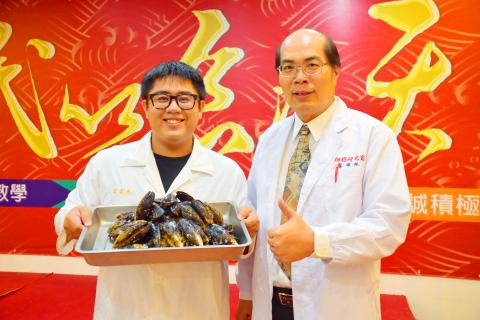Mussel consumption could help control obesity, reduce cholesterol, boost antioxidant enzymes and improve male reproductive health, National Taiwan Ocean University researchers have found.
While the high nutritional value and low cholesterol of the common mussel is well known, research indicates that eating mussels could have other health benefits, the university said on Tuesday.
Biomedicine and Pharmacotherapy is to publish its paper on the subject in January, the university said.

Photo: Yu Chao-fu, Taipei Times
The Matsu archipelago is the only source of farmed mussels in Taiwan, it said.
The research team said cellular tests and animal trials showed that glycoprotein in mussels could help with weight loss and reducing inflammation, said Kong Zwe-ling (龔瑞林), a coauthor of the paper and chair of the university’s Department of Food Science.
In cellular tests, glycoprotein from mussel extracts were found to inhabit lipid accumulation in rat cells, and reduce triglyceride and cholesterol accretion, Kong said.
When obese rats were fed mussel extract, they lost weight and exhibited reduced levels of triglyceride, cholesterol and low-density lipoproteins in their blood plasma, he said.
The research team reported a reduction of inflammatory agents and insulin resistance in the rats, while there were boosts to superoxide dismutase and glutathione peroxidase enzyme activation, he said.
Animal trials showed that mussel glycoprotein appears to increase testosterone, making male rats more fertile, he said.
The university’s Matsu campus is home to the newly founded departments of marine biotechnology, marine business management, and ocean engineering and technology, university president Chan Ching-Fong (張清風) said.
The university works closely with the Lienchiang County Government and local businesses to improve the value of Matsu fish farming, food industry and tourism, with mussel research being part of the effort, he said.

Taipei has once again made it to the top 100 in Oxford Economics’ Global Cities Index 2025 report, moving up five places from last year to 60. The annual index, which was published last month, evaluated 1,000 of the most populated metropolises based on five indices — economics, human capital, quality of life, environment and governance. New York maintained its top spot this year, placing first in the economics index thanks to the strength of its vibrant financial industry and economic stability. Taipei ranked 263rd in economics, 44th in human capital, 15th in quality of life, 284th for environment and 75th in governance,

The Sports Administration yesterday demanded an apology from the national table tennis association for barring 17-year-old Yeh Yi-tian (葉伊恬) from competing in the upcoming World Table Tennis (WTT) United States Smash tournament in Las Vegas this July. The sports agency said in a statement that the Chinese Taipei Table Tennis Association (CTTTA) must explain to the public why it withdrew Yeh from the WTT tournament in Las Vegas. The sports agency said it contacted the association to express its disapproval of the decision-making process after receiving a complaint from Yeh’s coach, Chuang

Control Yuan Secretary-General Lee Chun-yi (李俊俋) tendered his resignation last night, admitting that he had misused a government vehicle, as reported by media. His resignation was immediately accepted by the Control Yuan. In a statement explaining why he had resigned, Lee apologized for using a Control Yuan vehicle to transport his dog to a pet grooming salon on May 20. The issue first came to light late last month, when TVBS News reported that Lee had instructed his driver to take the dog to the salon. The news channel broadcast photos that it said were taken by an unnamed whistle-blower, which purportedly showed the

A former officer in China’s People’s Liberation Army (PLA) who witnessed the aftermath of the 1989 Tiananmen Square massacre has warned that Taiwan could face a similar fate if China attempts to unify the country by force. Li Xiaoming (李曉明), who was deployed to Beijing as a junior officer during the crackdown, said Taiwanese people should study the massacre carefully, because it offers a glimpse of what Beijing is willing to do to suppress dissent. “What happened in Tiananmen Square could happen in Taiwan too,” Li told CNA in a May 22 interview, ahead of the massacre’s 36th anniversary. “If Taiwanese students or